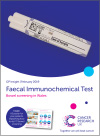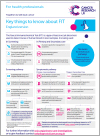There is a wealth of information about Faecal Immunochemical Testing for Health Professionals in Primary Care on the Bowel Screening Evidence and Resources page from Cancer Research UK. You can find links to these useful resources below.
 A publication from Cancer Research UK about engaging primary care in bowel screening. With sections including the pathway, the role of GP practices, the support available, the practical tips involving training, technical information on the test and practice data, and safety netting, this publication is a valuable read for primary care looking to participate in a FIT testing scheme.
A publication from Cancer Research UK about engaging primary care in bowel screening. With sections including the pathway, the role of GP practices, the support available, the practical tips involving training, technical information on the test and practice data, and safety netting, this publication is a valuable read for primary care looking to participate in a FIT testing scheme.
Cancer Research UK (2023) Primary Care Good Practice Guide: Bowel Cancer Screening



 A pictographic guide produced by CRUK which outlines how a patient should obtain a stool sample for the purpose of a FIT test in Scotland.
A pictographic guide produced by CRUK which outlines how a patient should obtain a stool sample for the purpose of a FIT test in Scotland. The Faecal Immunochemical Test (FIT) is a type of faecal occult blood test used to detect traces of human blood in stool samples. FIT is used:
The Faecal Immunochemical Test (FIT) is a type of faecal occult blood test used to detect traces of human blood in stool samples. FIT is used:


 A pictographic guide produced by CRUK which outlines how a patient should obtain a stool sample for the purpose of a FIT test in England.
A pictographic guide produced by CRUK which outlines how a patient should obtain a stool sample for the purpose of a FIT test in England.

 There are significant differences between each use of FIT which are important for health professionals to be aware of.
There are significant differences between each use of FIT which are important for health professionals to be aware of.